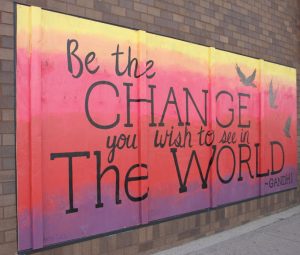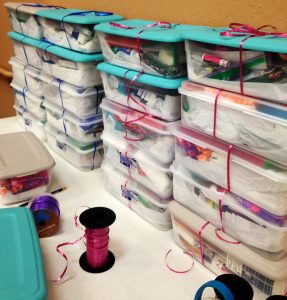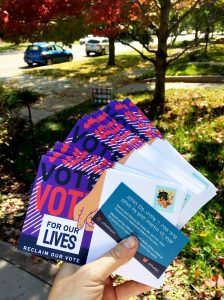A mitzvah project is a social action or community service project often undertaken by a student preparing to become B-Mitzvah. One becomes a Jewish adult (by Jewish law and tradition) simply by turning thirteen years old. A mitzvah project can be a meaningful way to mark this transition.
Mitzvah projects allow B-Mitzvah teens to demonstrate they are ready to become responsible adults through their willingness to positively impact their communities. A mitzvah project can serve as the beginning of a life-long commitment to the core Jewish value of tikkun olam, repairing the world.
What role can grandparents play?
 Grandparents often have a powerful influence on their grandchildren and, when the two collaborate on the teen’s mitzvah project, they can share their most important values. This is a chance for grandparents to reflect on which values remain important to them over time — perhaps showing kindness to others, acting in environmentally responsible ways, or behaving with humility and gratitude — and what personal qualities they hope their grandchildren will carry into the future.
Grandparents often have a powerful influence on their grandchildren and, when the two collaborate on the teen’s mitzvah project, they can share their most important values. This is a chance for grandparents to reflect on which values remain important to them over time — perhaps showing kindness to others, acting in environmentally responsible ways, or behaving with humility and gratitude — and what personal qualities they hope their grandchildren will carry into the future.
A mitzvah project is also an opportunity for the B-Mitzvah teen to think about and investigate their own budding values and concerns. When grandparents and grandchildren connect through learning about one another’s interests, hobbies, and passions, they can achieve the perfect mitzvah project partnership and choose a project that best reflects their common interests.
Below are four approaches as you and your grandchild work on their mitzvah project.
1. Connect.
Grandchildren are the crown of the elders. (Proverbs 17:6)
Judaism encourages the passing of wisdom from generation to generation and many children follow the example of those closest to them. Grandparents provide a unique perspective on the issues affecting our world today. They have a lifetime of wisdom and experience from which to draw. Grandchildren of B-Mitzvah age may just be beginning to address important causes and issues for the first time; however, they have strong ideals and opinions of their own.

This is the perfect moment for a grandparent to embrace the role of storyteller and for grandchildren to gain a new appreciation for a grandparent’s perspective. When grandparents and grandchildren interview each other about their lives, values, and ideas, they can both feel heard and can gain an opportunity to connect over shared principles. By sharing past experiences, the grandparent also provides footsteps for the grandchild to follow in, if they so desire.
When the teen listens to the grandparent’s stories and life experiences it can spark ideas for a mitzvah project. You might ask one another the following questions — and be ready to listen deeply for answers and ask follow-up questions.
What have you, your family, or your friends been personally affected by?
For example, if a friend or family member has experienced addiction, perhaps you want to raise money for a rehabilitation center such as Beit T’shuvah the nation’s first Jewish rehabilitation and treatment center. If a loved one has experienced an illness, you can host a Sharsheret Teal/Pink Shabbat in your synagogue or with your friends. If you were moved by a trip to Israel, you might support an Israeli organization such as Leket Israel that rescues surplus food or Yad Lakashish that provides work opportunities to Jerusalem’s needy elderly.
What bothers you about your neighborhood, community, or the world that you are determined to change? If you are concerned about the growing number of people experiencing homelessness, ask friends and family to donate toiletries and soft non-perishable snacks and put together blessing bags to deliver to those in need in your neighborhood. If you love animals, gather your friends, and spend a few hours making dog and cat toys to donate to a local animal shelter. If you love working with people, find your local Friendship Foundation chapter to volunteer with children of different abilities or a Dorot chapter near you to volunteer with the elderly.
If you are concerned about the growing number of people experiencing homelessness, ask friends and family to donate toiletries and soft non-perishable snacks and put together blessing bags to deliver to those in need in your neighborhood. If you love animals, gather your friends, and spend a few hours making dog and cat toys to donate to a local animal shelter. If you love working with people, find your local Friendship Foundation chapter to volunteer with children of different abilities or a Dorot chapter near you to volunteer with the elderly.
What are your talents and skills? And what do you like doing in your spare time?
Grandparents and teens might consider together what gives you pleasure or makes you feel good about yourself, or what you are passionate about that you would like to share with others less fortunate.
For example, if you are great at baking brownies or make a savory vegetable stew, call your local homeless shelter or other local organizations to see if you can lend a hand in the kitchen. If you enjoy being outdoors, visit Heal the Bay or Clean Action Ocean to find a beach cleanup in your area. Dancers might help teach dance classes for kids with disabilities. Or if there are any activities that the grandchild and grandparent enjoy doing together, such as knitting, you may want to knit some scarves, hats, and/or blankets together, and donate them to those in need during winter.
A mitzvah project can consist of hands-on work, fundraising, collecting materials, or spreading awareness for an organization you feel passionate about.
2. Collaborate.
Ben Zoma said: “Who is wise? One who learns from every person.” Pirkei Avot 4:1

The time leading up to B-Mitzvah often runs high with emotion and is fraught with checklists, guest lists, and last-minute practice and prep. When teens are stressed out, it can be reassuring to have someone, such as a grandparent, to lean on for help and support. Grandparents, who usually have space between themselves and the B-Mitzvah hubbub, may be able to give of their time and energy in ways that parents cannot during this hectic time.
Grandparents often have three valuable resources: lifelong friendships and networks, including at work; life experience; and time. Grandchildren are likely to have tech skills and know-how to draw on these resources; for example, by reaching out to friends and colleagues through videos with special effects and captions. Together, grandparents and grandchildren can pool their collective resources and skills to investigate projects and organizations that respond to the issues that spark the B-Mitzvah teen’s interests. Once the teen has decided on the mitzvah project, grandparents can be instrumental in helping their grandchild reach out to those who can help (parents, friends, relatives, rabbi, teachers, coach, etc.), research and understand why and how the issue has evolved over the years, and even provide transportation to the project itself.
3. Show ongoing commitment and accountability.
[Rabbi Tarfon] used to say: “You are not obligated to complete the work, but neither are you free to desist from it.” Pirkei Avot 2:16
 Most teens are busy, with packed days, and may find reward and value in a one-time or short-term project during the months leading up to their B-Mitzvah event. Others may want to make a long-term commitment to their cause, continuing well past the B-Mitzvah day. For example, some teens (and their families) may be eligible to raise a Seeing Eye dog. Mazon offers a Mitzvah Project Guide with ways to stay involved (sign up for advocacy alerts, honor the anniversary of your B-Mitzvah, follow Mazon on social media). Teens might also volunteer at a local organization, such as a food pantry or animal shelter, for a few months (Feeding Westchester is an example).
Most teens are busy, with packed days, and may find reward and value in a one-time or short-term project during the months leading up to their B-Mitzvah event. Others may want to make a long-term commitment to their cause, continuing well past the B-Mitzvah day. For example, some teens (and their families) may be eligible to raise a Seeing Eye dog. Mazon offers a Mitzvah Project Guide with ways to stay involved (sign up for advocacy alerts, honor the anniversary of your B-Mitzvah, follow Mazon on social media). Teens might also volunteer at a local organization, such as a food pantry or animal shelter, for a few months (Feeding Westchester is an example).
Grandparents make exceptional accountability partners. Whether they are available to support their grandchild in person by volunteering together or meeting them online or on the phone to hear about their work, the sharing of a mitzvah project with grandparents encourages follow through. It’s also a great way to strengthen the bond between grandparent and grandchild.
4. Share.
Rabbi Eliezer said: “Let the honor of your friend be as dear to you as your own.” Pirkei Avot 2:10
The teen (and possibly) grandparent may want to share the mitzvah project in a variety of ways with family, friends, a synagogue community, or even guests at the B-Mitzvah ceremony.

Documenting the mitzvah project partnership can ensure the memories last forever. Take pictures throughout the process. Teens might publicize the project through an ongoing blog, photo essays, or short videos that they post on TikTok. They might write about it in their B-Mitzvah speech, creating a poster or slideshow showing how they worked together with a grandparent, or sharing, with permission, parts of their conversations with their grandparent. Or they can create a digital visual memory folder in BublUp and send a link to invite family and friends to join.
The following prompts can be useful in speaking about a mitzvah project: “In doing my mitzvah project, I learned that … I appreciate that …. I wish that … I hope that ….” or “My project was important to me because….”
At its essence, undertaking a mitzvah project process with a grandparent can instill a sense of responsibility, teach accountability, provide an opportunity to give back, build family relationships, and open a student’s eyes and heart to the injustices and disadvantages experienced by others. What a blessing to do this in partnership with a trusted grandparent’s guidance, love, and support.
Rabbi Adrianne Pasternak is Director of Immersive Experiences at Tzedek America. Adrianne is a Jewish educator, birth and postpartum doula, and life-cycles rabbi with over twenty years of experience in educational leadership.
Visit https://tzedekamerica.org/mitzvah-project-central/ to learn more about Mitzvah Project Central which provides compassionate direction and support as we guide B’nai Mitzvah students through their mitzvah projects. Mitzvah Project Central motivates students with weekly Zoom office hours, a “Yelp-like” database of pre-vetted organizations and mitzvah project ideas, and regular accountability check-ins throughout our six to twelve-month mitzvah project process.
With gratitude to teen reviewer Annelia Ritter.
Photographic Credits
Hands courtesy of Pixabay
Grandparent and grandchild with cookies courtesy of Pexels
Be the Change by Stephanie Fink
Supplies boxes by Sonja Lippmann
Grandchild and grandparent with cups courtesy of Pexels
Vote for Our Lives by Stephanie Fink
Teen with raised arm Stephanie Fink

